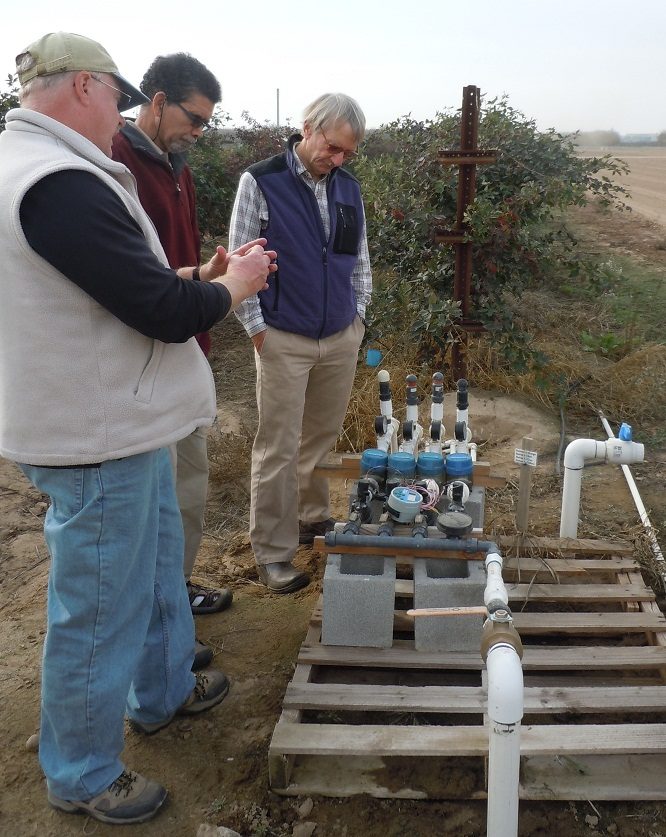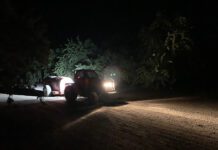
Significant improvements to irrigation efficiency in the almond industry and the tools developed by the Almond Board of California to assist growers in that vital space can be attributed in large part to two UC ANR Emeritus, one of which lost his battle with cancer in 2022.
Larry Schwankl, a long time UC Cooperative Extension specialist in irrigation, passed away in May 2022, at the age of 68.
Given the fact that California is in perpetual cycles of drought, it’s hard to estimate the impact Schwankl had on the state’s agriculture industry with his career focus on sprinkler, drip and flood irrigation management.
“Larry’s extension work was very practical and addressed the needs of the growers in California,” said Khaled Bali, UCCE Irrigation Water Management Specialist and Director of Kearney Agricultural Research and Extension Center. Schwankl helped develop several tools for growers including the UC ANR publications Measuring Irrigation Water Flow Rates and Maintaining Microirrigation Systems.
Another tool Schwankl was instrumental in building out the content behind was ABC’s Almond Irrigation Improvement Continuum. Working in partnership with long-time colleague Terry Prichard, retired UC Extension water management specialist, the irrigation tool served as a benchmark and starting point for advancing the ABC irrigation outreach program.
“Larry and Terry were key in writing the Continuum and seeking the consensus of other UC irrigation experts, which was quite a task, but with much patience and focus they were able to accomplish this,” said Bob Curtis, ABC’s retired director of agricultural affairs. He added that the two authors were very proud that the Continuum was the first comprehensive irrigation practices resource specific to a single crop. “In effect, it’s a one-stop shop for what you need to know to irrigate the crop.”
Schwankl, a native Minnesotan, spent time in Iowa before landing in California to attend UC Davis. After working for FEMA in Philadelphia, he returned to UC Davis to gain his Ph.D. In 2004, he transferred from the UC Davis Department of Land, Air, and Water Resources Department to the University’s Kearney Agricultural Research and Extension Center (KARE) near Parlier, CA, where he remained until he retired in 2014.
In 2004, Schwankl married Carol Frate, UC Cooperative Extension advisor, of Visalia and transferred to Kearney Agricultural Research and Extension Center near Parlier.
In 2014, the Irrigation Association presented Schwankl with their Person of the Year Award. In their award announcement, Dana Osborne Porter, associate professor and extension agricultural engineer in the Department of Biological and Agricultural Engineering at Texas A&M University, was quoted as saying “Through his well-recognized applied research program, technology transfer efforts and service activities, Dr. Schwankl has dedicated his career to developing, evaluating and promoting water-efficient technologies and irrigation best management practices.”
People who worked with Schwankl often use the term “thoughtful” when describing him, and that went for the subject matter as well. “He taught me that you cannot irrigate knowledgeably without a flow meter, and you might as well just gamble away your orchard unless you do a distribution uniformity test on the irrigation system,” Ben Fabor, UCCE farm advisor in Ventura County, told UC ANR. “These are critical tools, creating good water management and healthy orchards.”
Curtis reiterated the “thoughtful” aspect of Schwankl, adding he was a good teacher because of that attribute. When approached by Curtis on a question or insight, Schwankl would often take some time to discuss the answer with Prichard. “There were times when I would have to be patient so that the two of them could confer to give me the best answers to the questions I was asking. This was a good exercise for me to practice and enhance my ability to be patient.”
Even in retirement, Schwankl was helping growers. Bali said after his 28-year career was over, he would often come back to the KARE Center to discuss topics with current irrigation advisors.
Schwankl will be remembered and missed by the California almond industry.










